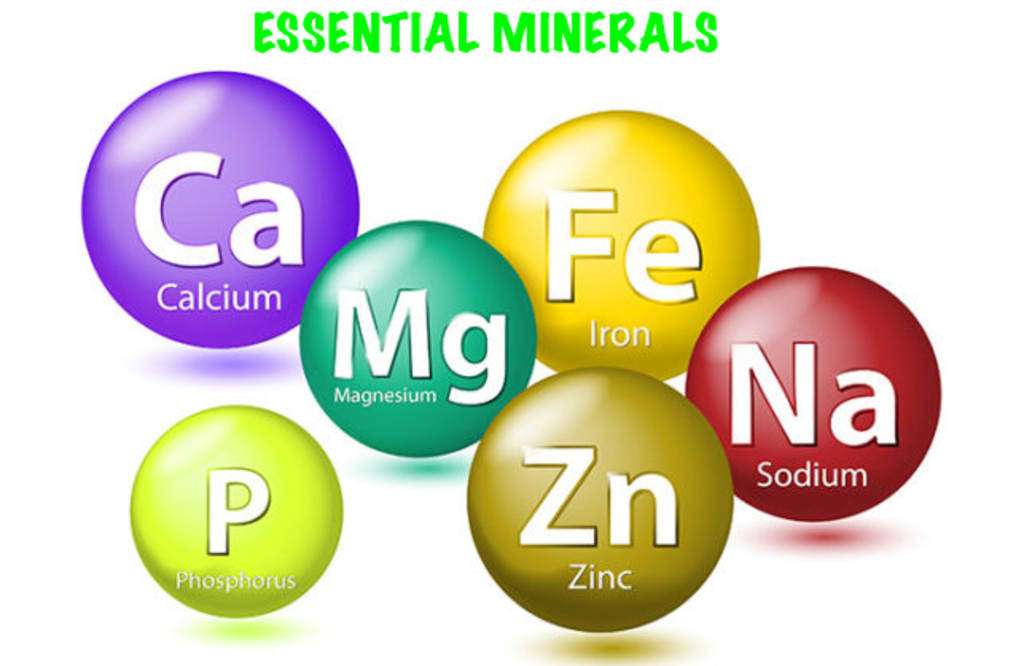MINERALS OF YOUR BODY
Essential Minerals that Body Needs

Your body is composed of numerous elements, including minerals. Minerals are inorganic substances that are required in small amounts to carry out various physiological processes. These minerals are essential for the proper functioning of the human body, including the formation of bones and teeth, maintaining proper fluid balance, and regulating metabolism. Here are the essential minerals of the human body:
1. Calcium: Calcium is the most abundant mineral in the human body and is essential for strong bones and teeth. It also plays a crucial role in muscle function, nerve transmission, and blood clotting.
Some of the sources of foods rich in calcium include:
1) Dairy Products: Milk, yogurt, and cheese
2) Leafy Greens: Kale, collard greens, spinach, and turnip greens
3) Seafood: Canned salmon and sardines with bones
4) Nuts and Seeds: Almonds, sesame seeds, and chia seeds
5) Fortified Foods: Fortified tofu, soy milk, and orange juice
6) Beans and Lentils: Chickpeas, black beans, and lentils
7) Some fruits: oranges, blackcurrants, blackberries
8) Other sources: Broccoli, okra, cabbage, figs, amaranth, edamame, fortified cereals and blackstrap molasses
2. Phosphorus: Phosphorus is the second most abundant mineral in the human body and is also important for strong bones and teeth. It is also involved in energy production, DNA and RNA synthesis, and cell signaling.
Some of the sources of foods rich in phosphorus include:
1. Seafood such as salmon, tuna, and shrimp
2. Dairy products such as milk, yogurt, and cheese
3. Meat such as beef, pork, and chicken
4. Nuts and seeds such as almonds, pumpkin seeds, and sunflower seeds
5. Whole grains such as brown rice, quinoa, and whole wheat bread
6. Legumes such as lentils, chickpeas, and kidney beans
7. Vegetables such as broccoli, potatoes, and sweet potatoes.
3. Magnesium: Magnesium is involved in over 300 enzymatic reactions in the body and plays a vital role in muscle and nerve function, blood pressure regulation, and the synthesis of DNA, RNA, and proteins.
Some of the sources of Magnesium include:
1. Almonds: A quarter-cup of almonds contains around 100mg of magnesium.
2. Spinach: A cup of cooked spinach contains around 150mg of magnesium.
3. Dark chocolate: An ounce of dark chocolate (at least 70% cocoa) contains around 60mg of magnesium.
4. Avocado: A single medium-sized avocado contains around 60mg of magnesium.
5. Black beans: A cup of cooked black beans contains around 120mg of magnesium.
6. Tofu: A quarter-cup of firm tofu contains around 60mg of magnesium.
7. Brown rice: A cup of cooked brown rice contains around 80mg of magnesium.
8. Other foods rich in magnesium include pumpkin seeds, cashews, edamame, quinoa, and salmon.
4. Sodium: Sodium is essential for maintaining proper fluid balance in the body and is involved in nerve and muscle function. However, consuming too much sodium can lead to high blood pressure, which is a risk factor for heart disease, stroke, osteoporosis and kidney disease.
Some of the sources of sodium include:
1. Table salt: Salt is almost pure sodium, with one teaspoon containing around 2,300mg of sodium.
2. Processed meats: Deli meats, bacon, and sausage are high in sodium due to the added salt and preservatives.
3. Canned soups: Many canned soups contain high levels of sodium for flavor and preservation purposes.
4. Cheese: Cheese, especially hard cheeses like parmesan and feta, are high in sodium.
5. Pickles: Pickles are preserved in saltwater and contain high levels of sodium.
6. Soy sauce: Soy sauce is a popular condiment that is high in sodium, with one tablespoon containing around 1,000mg of sodium.
7. Bread: Some types of bread can be high in sodium due to the added salt and leavening agents.
It's important to monitor sodium intake and choose low-sodium options as possible.
5. Potassium: Potassium is important for nerve and muscle function, maintaining proper fluid balance, and regulating heart rhythm. It also plays a role in the synthesis of proteins and the metabolism of carbohydrates.
Some of the good sources of potassium include:
1. Bananas: This fruit is one of the most well-known sources of potassium. A medium-sized banana contains around 400-450mg of potassium.
2. Avocado: A single medium-sized avocado contains around 700-800mg of potassium.
3. Spinach: A cup of cooked spinach contains around 800mg of potassium.
4. Sweet potato: A medium-sized sweet potato contains around 500mg of potassium.
5. White beans: A cup of cooked white beans contains around 1000mg of potassium.
6. Salmon: A 3-ounce serving of cooked salmon contains around 400-500mg of potassium.
7. Yogurt: A cup of plain yogurt contains around 500-600mg of potassium.
8. Other foods rich in potassium include dried apricots, prunes, raisins, coconut water, oranges, and tomato juice.
6. Chloride: Chloride is essential for maintaining proper fluid balance in the body and is involved in the production of digestive juices in the stomach.
Chloride can be found in:
1. Table salt (sodium chloride)
2. Seaweed and sea vegetables
3. Olives and pickles
4. Rye bread and other whole grain breads
5. Tomatoes and tomato-based products such as tomato sauce
6. Celery and other vegetables with a high water content
7. Milk and other dairy products.
Chloride is an essential nutrient,however, excessive intake of salt (which contains sodium chloride) can have negative health effects such as high blood pressure. It is therefore recommended that you consume chloride-rich foods in moderation and to limit sodium intake.
7. Iron: Iron is essential for the production of hemoglobin, a protein in red blood cells that carries oxygen throughout the body. Iron also plays a role in energy production and immune function.
Some of the foods rich in iron include:
1. Red meat such as beef, lamb, and liver
2. Poultry such as chicken and turkey
3. Seafood such as oysters, clams, and tuna
4. Legumes such as lentils, chickpeas, and beans
5. Nuts and seeds such as pumpkin seeds, cashews, and almonds
6. Dark leafy greens such as spinach, kale, and collard greens
7. Whole grains such as quinoa, brown rice, and fortified cereals.
Vitamin C can help the body absorb iron better, so it's recommended to pair iron-rich foods with sources of vitamin C. It's important to note that excessive iron intake can also have negative health effects, so it's best to consult with a healthcare professional or nutritionist before making significant changes to your diet.
8. Zinc: Zinc is involved in the synthesis of DNA, RNA, and proteins and plays a role in immune function, wound healing, and the metabolism of carbohydrates, proteins, and fats.
Some of the foods rich in Zinc include:
1. Seafood such as oysters, crab, and lobster
2. Meat such as beef, pork, and chicken
3. Legumes such as chickpeas, lentils, and beans
4. Nuts and seeds such as pumpkin seeds, cashews, and almonds
5. Dairy products such as milk, cheese, and yogurt
6. Whole grains such as quinoa, brown rice, and whole wheat bread
7. Vegetables such as mushrooms, spinach, and asparagus.
Excessive zinc intake can have negative health effects. It is therefore recommended that you consult with a healthcare professional or nutritionist before making significant changes to your diet or taking zinc supplements.
9. Copper: Copper is involved in the production of red blood cells and the formation of connective tissues. It also plays a role in the synthesis of neurotransmitters, which are chemicals that transmit signals in the brain.
Some of the foods rich in copper include:
1. Shellfish such as oysters, clams, and crabs
2. Organ meats such as liver and kidneys
3. Nuts and seeds such as cashews, sunflower seeds, and almonds
4. Legumes such as lentils, chickpeas, and soybeans
5. Dark chocolate
6. Leafy greens such as kale, spinach, and Swiss chard
7. Whole grains such as quinoa, buckwheat, and oats.
It's important to note that excessive intake of copper can lead to toxicity, so it's recommended to consult with a healthcare professional or nutritionist before making significant changes to your diet or taking copper supplements.
10. Manganese: Manganese is involved in the metabolism of carbohydrates, proteins, and cholesterol. It also plays a role in bone development and wound healing.
Some of the sources of Manganese include:
1. Whole grains such as brown rice, oatmeal, and whole wheat bread
2. Nuts and seeds such as almonds, pumpkin seeds, and sesame seeds
3. Legumes such as lentils, chickpeas, and black beans
4. Leafy greens such as spinach, kale, and collard greens
5. Pineapple
6. Berries such as raspberries and blueberries
7. Tea, especially black tea.
It's important to note that while manganese is an essential nutrient, excessive intake can have negative health effects, so it's recommended to consume manganese-rich foods in moderation.
11. Iodine: Iodine is essential for the production of thyroid hormones, which regulate metabolism and growth. A deficiency in iodine can lead to goiter and other thyroid disorders.
Good sources of iodine include iodized salt, seafood, and seaweed.
1. Seafood such as seaweed, shrimp, and cod
2. Dairy products such as milk, cheese, and yogurt
3. Eggs
4. Iodized salt
5. Some fruits such as strawberries and cranberries
6. Vegetables such as potatoes, spinach, and navy beans
7. Bread and other baked goods made with iodized salt.
It's important to note that iodine deficiency can lead to thyroid problems, so it's recommended to ensure adequate iodine intake through diet or supplements. However, excessive iodine intake can also have negative health effects, so it's best to consult with a healthcare professional before making significant changes to your diet or taking iodine supplements.
12. Selenium: Selenium is involved in the production of antioxidants, which protect the body from damage caused by free radicals. It also plays a role in immune function and thyroid hormone metabolism.
Some of the sources of selenium include:
1. Brazil nuts
2. Seafood such as tuna, salmon, and sardines
3. Meat such as beef, pork, and chicken
4. Eggs
5. Whole grains such as brown rice, quinoa, and oats
6. Dairy products such as milk and cheese
7. Mushrooms such as button mushrooms and shiitake mushrooms.
Please note that excessive intake of selenium can have negative health effects, It is recommended that one consumes selenium-rich foods in moderation. Also, selenium supplements should only be taken under the guidance of a healthcare professional.
13. Fluoride: Fluoride is important for strong teeth and bones and is often added to drinking water to prevent tooth decay.
Some of the sources for Flouride include:
1. Tea, especially green and black tea
2. Fish such as canned sardines and canned salmon
3. Seafood such as crab and shrimp
4. Grapes and raisins
5. Potatoes
6. Some approved bottled water brands that contain fluoride.
Excessive intake of fluoride can have negative health effects, such as dental fluorosis. It is therefore recommended that you consume fluoride-rich foods and beverages in moderation. Also, the amount of fluoride in bottled water can vary, do check the label before consuming!
14. Chromium: Chromium is involved in the metabolism of carbohydrates, proteins, and fats and helps regulate blood sugar levels.
Some of the foods rich in Chromium include:
1. Whole grains such as brown rice, oats, and barley
2. Meat such as beef, turkey, and chicken
3. Seafood such as clams, oysters, and lobsters
4. Nuts and seeds such as almonds, peanuts, and sunflower seeds
5. Spices such as black pepper and thyme.
Chromium being an essential nutrient, can also have negative health effects if consumed in excess. It is equally recommended that it is consumed in moderation. Additionally, chromium supplements should only be taken under the guidance of a healthcare professional.
Minerals are thus essential for the proper functioning of the human body. Consuming a balanced diet that includes a variety of foods rich in these minerals can help ensure that the body receives the nutrients it needs to carry out its physiological functions. Eating a balanced diet that includes a wide range of fruits, vegetables, whole grains, lean proteins, and healthy fats can help provide the body with the necessary nutrients it needs for optimal health. Lets keep ourselves healthy!
Yours Truly,
Al Rauf Okal
About the Creator
Al Rauf Okal
Do you love your body? I am an enthusiast of healthy living. I’ll be sharing on ways of living healthy. We got to enjoy life and make the best out of it. Make a point to subscribe, support and give reviews.






Comments
There are no comments for this story
Be the first to respond and start the conversation.